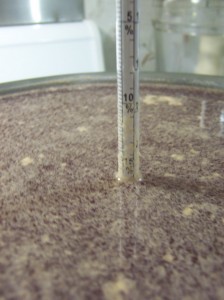If we wish to honor our Elders — our ancestors; our blood-roots — then we can do well to learn from their wisdom. Their wisdom honors us, if we are attentive to it. In some way, I regard Elderberries, Reishi Mushrooms, and Rose Hips as Herbal Elders. Our Elders used these plants/fungi considerably. These herbs have been our companions as humans for a very long time.
All three of them have profound healing properties on some level, all working in close harmony with our immune systems, strengthening and regulating them when they are out of balance. All three herbs are abundant this time of year, going into the cooler months where we are more likely to benefit from their properties. And all three have been used to strengthen the immune system, aid in healing sickness, in many traditions and cultures worldwide, all over the planet, for millennia.
I wanted to bring all of these Elders together in a mead. This chronicle will start with the ingredients used first.
Reishi (Ganoderma tsugae)
“Reishi is that age old medicine cited thousands of years ago in several texts and scripts as being a tonic for emperors. At one time this mushroom was specifically used under the prestigious vestiges of the ruling class, but it has since made its way into the pantries of us common folk. Traditional and contemporary Chinese medicine admire it as a tonic benefiting vital energy or “Qi”, and it is popularly prescribed for a multitude of maladies.”
Reishi seems like an elder to me. It has been in use for thousands of years; its Chinese name translates to “mushroom of the spirit” or “supernatural mushroom.” There is a wisdom to this “immortality” fungus that western scientists are just beginning to wonder about.
Much has been written about Reishi; there are plenty of places to learn about it. I won’t repeat any more here, other than to say Reishi is one of my absolute favorite herbs to work with. Its decocted taste is extremely bitter, so I’ve wanted to incorporate it into a brew for a while now. Elder Mead seemed an obvious choice.
I began by chopping up my reishi into tiny pieces, to increase their surface area which will allow more medicine to be in the tea:

I put the reishi into 2 gallons of spring water, brought it to a simmer, and let it decoct for about 10 hours.
Rose Hips (Rosa canina)
Rose Hips to me embody the wisdom of the divine feminine, our Mother-Elders have an unbroken, living lineage back to the dawn of time. Their scent conjures springtime, and they look over us, nourishing us with vitamin C and their other, many nutrients. Bringing this mother-herb into this mead was a no-brainer.
Right at the end of the Reishi decoction, I put the (frozen, then thawed, to soften their skins) rose hips into the tea and let everything (hot water, reishi bits, rose hips) infuse and cool overnight. The next morning, I strained the tea, which was a gorgeous, clear color tasting both bitter and tart:

Once the tea cooled to blood temperature, I was ready to put everything else together.
Elderberry (Sambucus Nigra)
Elderberry is one of my favorite berries to brew with. 2010’s Elderberry Mead was one of my favorites of the year, both in terms of taste and in terms of its effects on the body. Elderberries are extremely medicinal, with a long history of medicinal lore not only from the past, but also right up through the present, where its “H1N1 inhibition activities… compare favorably” to other known flu medications. Elderberry syrup is one common way to get this fantastic medicine into our bodies, but mead works just as well, and might last longer.
I got some gorgeous, purple elderberries:

I did the usual; I whizzed these up in the VitaMix and then strained it into the must. This time, however, I did something different with the mark; after I strained it I saved the pulp and the seeds, put the mark into a small (leftover Rite Chocolate) jar and then covered it all up with vodka. I’ll let this tincture for a few weeks, strain it, then mix it with honey to make an Elderberry Cordial:

I’ll report back as to how the tincture goes.
Then, I mixed in enough honey to get up to a 17% initial alcohol potential:
Transfer everything to the carboy, give a good shake, label it, and clean up the bit of mess, and we’re good to go:

Here’s one for the Elders. Tonight I raise my horn to you. Hail to the Blood Roots! Hail to the Mud Roots! May your wisdom bestow us with health in the coming cold months….
UPDATE, 7 Jan
This is quite dry, and very bitter from the reishi! Nice! 1% remaining alcohol potential, which means this is quite strong at 16% alcohol. This one is very complex and very nice…. should just get better as it ages.


One thought on “Elder Mead”
Comments are closed.